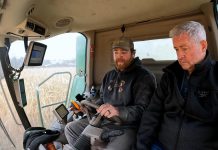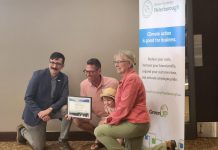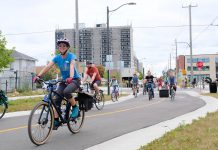
The second round of Peterborough-Kawartha candidates squaring off to demonstrate why they should become the region’s next MPP began on Thursday night (May 12) at Trent University — with one notable no-show.
Incumbent Dave Smith (Progressive Conservative), who was planning to attend, dropped out of the debate at the last minute because of a “family emergency.”
All parties with seats in the legislature were invited to participate and Jen Deck (NDP), Greg Dempsey (Liberal), and Robert Gibson (Green Party) turned up prepared to answered five questions they received in advance as well as never-before-seen questions submitted by community members.
Capably moderated by Trent University students Malaika Collette, Gabriel Trozzo Stamou, and Mary Ellen Abberger, the night began with a question about the biggest challenges and opportunities related to the climate crisis each candidate sees in the riding.
Deck started by touting the NDP’s green new democratic deal, “the boldest, most effective and achievable plan Ontario’s ever had.”
Gibson began by saying past governments have failed to curtail sprawl “resulting in the loss of natural spaces, [which] also locks the region into fossil fuel and coal dependency.”
Dempsey answered, “The biggest challenge to climate action in Peterborough-Kawartha is the Doug Ford conservative government. They’ve ripped up climate contracts, they put stickers on gas pumps, [and] they pretended the climate emergency doesn’t exist.”
In Smith’s absence, each candidate spent much of the night lambasting the Ford Government for the following:
- Promising to build the 413 that, if built, would run 59 kilometres from Vaughn to Brampton through the Greenbelt.
- The cancellation of Liberal-initiated green energy projects.
- “Trying to carve up the Greenbelt three times.”
- Going all in on gas-fired power plants thus increasing Ontario’s greenhouse gas emissions.
- Firing the Ontario environmental commissioner.
- Abuse of Minister’s zoning prders (which are only meant to be used in extraordinary circumstances) to override local planning authorities and allow for development on protected lands.
Closely matched on policy, Deck, Dempsey, and Gibson never meaningfully clashed. Instead, each took their time highlighting their respective party’s environmental philosophy, occasionally pausing for a respectful rebuttal or clarification.
Of special note was the thoughtful way in which each candidate centred Indigenous rights, knowledge, and ways of being in their remarks. At one point Dempsey said the Liberals would “meaningfully engage with Indigenous people.”
Gibson said the Green Party would “work towards decolonizing the environmental movement.”
Deck suggested the NDP, “is committed to implementing the United Nation’s Declaration on the Rights of Indigenous Peoples and apply it to provincial laws.”
What else can Peterborough-Kawartha voters expect from each party on the environmental file if elected?
Gibson said the Green Party would push to cut Ontario’s pollution in half by 2030 and go to net zero by 2045. The Greens would do this by adopting a zero-carbon law that sets a “fair share carbon budget” for the rest of the century. They would also retrofit homes and businesses, electrify transit, de-carbonize electricity, and protect the natural environment.
Dempsey said the Liberal plan would reduce emissions by 50 per cent by 2030. They will also make all transit fares across the province $1, and the Liberals would protect 30 percent of greenspace by 2030, which would include the creation of five new provincial parks.
According to Deck, the NDP would mandate all newly built public, residential, and commercial buildings to be net zero emissions by 2030. They would establish a retrofit program the NDP claims will produce $15 billion of annual economic activity and create 100,000 new jobs.
Deck said the NDP would also initiate a “zero emission vehicle strategy” aiming for 100 per cent electric vehicle sales by 2035, and would electrify all transit by 2040. Finally, Deck said, her party will “restore integrity to the land use planning process by revoking ministerial zoning orders.”
Organized by youth environmental activists, GreenUP, the Kawartha World Issues Centre, For Our Grandchildren, the Federation of Ontario Cottagers’ Association, the 70-minute debate was livestreamed on YouTube.
Peterborough-Kawartha candidates who were not invited to participate in the debate were Tom Marazzo (Ontario Party), Rebecca Quinnell (New Blue Party), and Dylan Smith (None Of The Above Party).


























